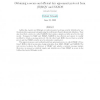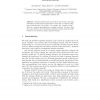50 search results - page 6 / 10 » A New Two-Party Identity-Based Authenticated Key Agreement |
SCN
2010
Springer
13 years 5 months ago
2010
Springer
In this work, we consider Authentication and Key Agreement (AKA), a popular client-server Key Exchange (KE) protocol, commonly used in wireless standards (e.g., UMTS), and widely c...
DCC
2008
IEEE
14 years 7 months ago
2008
IEEE
LaMacchia, Lauter and Mityagin recently presented a strong security definition for authenticated key agreement strengthening the well-known Canetti-Krawczyk definition. They also ...
JUCS
2008
13 years 7 months ago
2008
Unknown Key-Share (UKS) resilience is a basic security attribute in authenticated key agreement protocols, whereby two entities A and B should not be able to be coerced into shari...
TCOS
2010
13 years 2 months ago
2010
Password Authenticated Key Exchange (PAKE) is one of the important topics in cryptography. It aims to address a practical security problem: how to establish secure communication be...
EUROCRYPT
2001
Springer
13 years 12 months ago
2001
Springer
Message integrity from one sender to one receiver is typically achieved by having the two parties share a secret key to compute a Message Authentication Code (MAC). We consider the...


